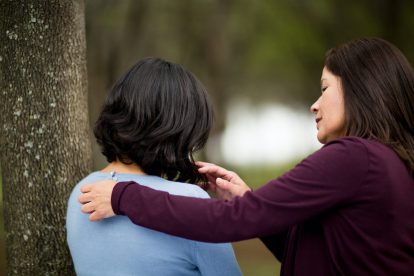Helping a Sibling with Heroin Addiction: Exploring Treatment Options Together

If you have a sibling with heroin addiction, broaching the possibility of treatment can be tough. But with the right help, you can help them realize the benefits of professional care, such as withdrawal management, therapy, and peer support networks. By walking this path together, you can guide your sibling toward a future defined by change and positivity.
Clara still feels a vague sense of guilt and sorrow when she remembers the years she spent watching her younger sister spiral into heroin addiction. “I felt so helpless,” she says. “It was like she was drowning right next to me and I couldn’t reach her.”
Clara tried everything, from attempting to discuss the problem logically with her sister (which didn’t go over well) to asking friends and family for an intervention (which also didn’t go over well) to trying to trick her sister into attending an AA meeting. “The minute she realized where we were, she blew up at me. She got out of the car and took a taxi home.” Clara recalls with a wince. “In retrospect, it wasn’t the greatest idea, but I didn’t know what else to do.”
It wasn’t until Clara saw her own doctor, to help her cope with her feelings about her sister’s situation, that she realized what she’d been doing wrong. “You can’t force someone into wanting to be well. It doesn’t work like that. But you can show them their options and let them know you’re there to help. And you don’t have to do it alone.”
As Clara eventually learned, by familiarizing yourself with best practices for broaching the subject of addiction treatment and exploring your options together, you too can help your sibling take their first steps towards recovery—not with force, but with loving and firm support, and a little help from a professional interventionist.
How to Talk About the Possibility of Treatment
When dealing with heroin addiction, you need to remember the power that it can exert over people. No matter how much you see the struggle, the person in question might be completely oblivious. Even if they are aware they have a problem, they may not fully accept these thoughts, or are unwilling to act on them. Because of this, you need to seriously ask yourself if broaching the subject of treatment alone is a viable option.
If you’re close enough with your sibling and believe that they will take you seriously, showing them concern could be a catalyst for change. But the reality is in most cases, it takes more than this. You might have even tried before with no luck. Luckily, you don’t have to do this alone.
Using an interventionist is recommended because they are trained specialists that have helped people start their road to recovery many times before. Not only does this take the weight off of your shoulders, it can help you and your loved ones channel your concern in the most effective way possible.
Interventionists can help with:
- Determining the best intervention model (ie. confrontational, invitational, motivational)
- Expressing your concerns and helping your sibling understand the severity of the situation
- Communicating your “bottom lines” (i.e. no longer lending your sibling money)
- Showing your sibling the potential that lies in treatment
Using their expertise and objective nature, they can help you guide your sibling toward treatment. Given the close nature of many sibling relationships and the touchy subject of addiction, having an experienced outsider help you plan your method of action is ideal.
The Benefits of Professional Medical Care
Giving your sibling a glimpse into the hope offered by treatment is a fantastic first step, but what’s even better is when they finally get there and see their own potential to heal for themselves. While each person’s personal struggle is different, there are treatment modalities that form the basis of most addiction programs. These treatments are tweaked and adapted to form the core of a personalized program designed to help your sibling work through, and recover from, their addiction.
Withdrawal Management
Heroin is notorious for its painful withdrawal. While there’s no way to completely avoid this obstacle, facing it within a treatment setting gives people the tools necessary to manage it and learn from the experience. Suboxone is one such option—it acts on the opioid receptors that heroin does, only in a manner that does not feed into addiction. As Candace, Clara’s sister, explains, “There’s a reason addicts keep getting high. That sense of euphoria, you know? But with the Suboxone, there’s none of that. No euphoria whatsoever.”
On its own, it’s a band-aid treatment, but in the hands of a professional team of specialists, it can become a powerful tool to help people struggling with addiction ease themselves safely and gradually out of dependence. It is during this period that they begin to work on understanding how they fell into addiction in the first place.
Therapy
Unearthing the roots of addiction is tough when people are faced with withdrawal symptoms that seem to take over their life. Yet when they learn to manage them, they will find they have much more energy to channel into positive avenues. One such avenue is therapy, which is a crucial facet of addiction recovery.
In residential treatment, therapy can mean many things. It can be a one-on-one experience that helps struggling addicts delve into the inner workings of their mind and the thoughts that drive their drug-seeking behavior. By understanding these thoughts, they will craft new strategies for long-term sobriety. Or, it may mean holistic therapies like mindfulness meditation, which can promote self-awareness, well-being, and optimism. Most likely, it will be a matter of finding a combination of these and other therapies that will work best for a person’s unique personal journey.
Peer Support Networks
Peer support comes in many forms. Regardless of which becomes a part of the treatment plan, this is a crucial part of the process as it allows individuals to grow and learn alongside others that are on parallel journeys. Whether this means something like a 12-step program or continuing care that allows for maintaining contact with people that positively influenced recovery, social connection, and shared experience is invaluable.
Walking the Path to Recovery Together
In a residential treatment program, your sibling will have access to the tools and therapies necessary to move past addiction and begin to build a new, healthier lifestyle for themselves. What’s more, they won’t have to go through recovery alone—and neither will you. Family therapy will play a major role in helping you, your sibling, and perhaps other members of your family work together better to support and understand one another through the recovery process, while the duration and depth of a long-term treatment plan in a residential setting will give your family the time, space, and support necessary to fully work through your sibling’s addiction and its underlying causes. The end result? You and your sibling will be able to walk the path to recovery and move toward a new, happier future together, one step at a time.
Bridges to Recovery offers comprehensive residential treatment for people struggling with mental health disorders as well as co-occurring substance abuse and eating disorders. Contact us to learn more about our renowned Los Angeles and San Diego-based programs and how we can help you or your loved one start on the path to lasting wellness.






